Summary Overview
Bulk Road Freight Services Market Overview:
The global market for bulk road freight services is witnessing substantial growth, fueled by rising industrialization, increasing demand for efficient logistics solutions, and advancements in freight management technologies. This market encompasses diverse applications, including transportation of raw materials, perishables, and hazardous goods. This report provides a comprehensive analysis of emerging procurement trends, emphasizing cost-saving measures through strategic partnerships and the adoption of digital logistics tools to streamline operations.
Future procurement challenges involve accurate demand forecasting, supported by digital procurement platforms to enhance adaptability in this dynamic sector. Strategic sourcing and efficient procurement practices are crucial for optimizing freight services and ensuring regulatory compliance. With rising competition, companies are leveraging market intelligence and procurement analytics to improve supply chain operations and gain a competitive edge.
The outlook for the bulk road freight services market remains positive, with significant growth projected through 2032 due to various contributing factors:
-
Market Size: The global bulk road freight services market is anticipated to reach USD 100.81 Billion by 2032, expanding at a CAGR of approximately 11.31% from 2024 to 2032.
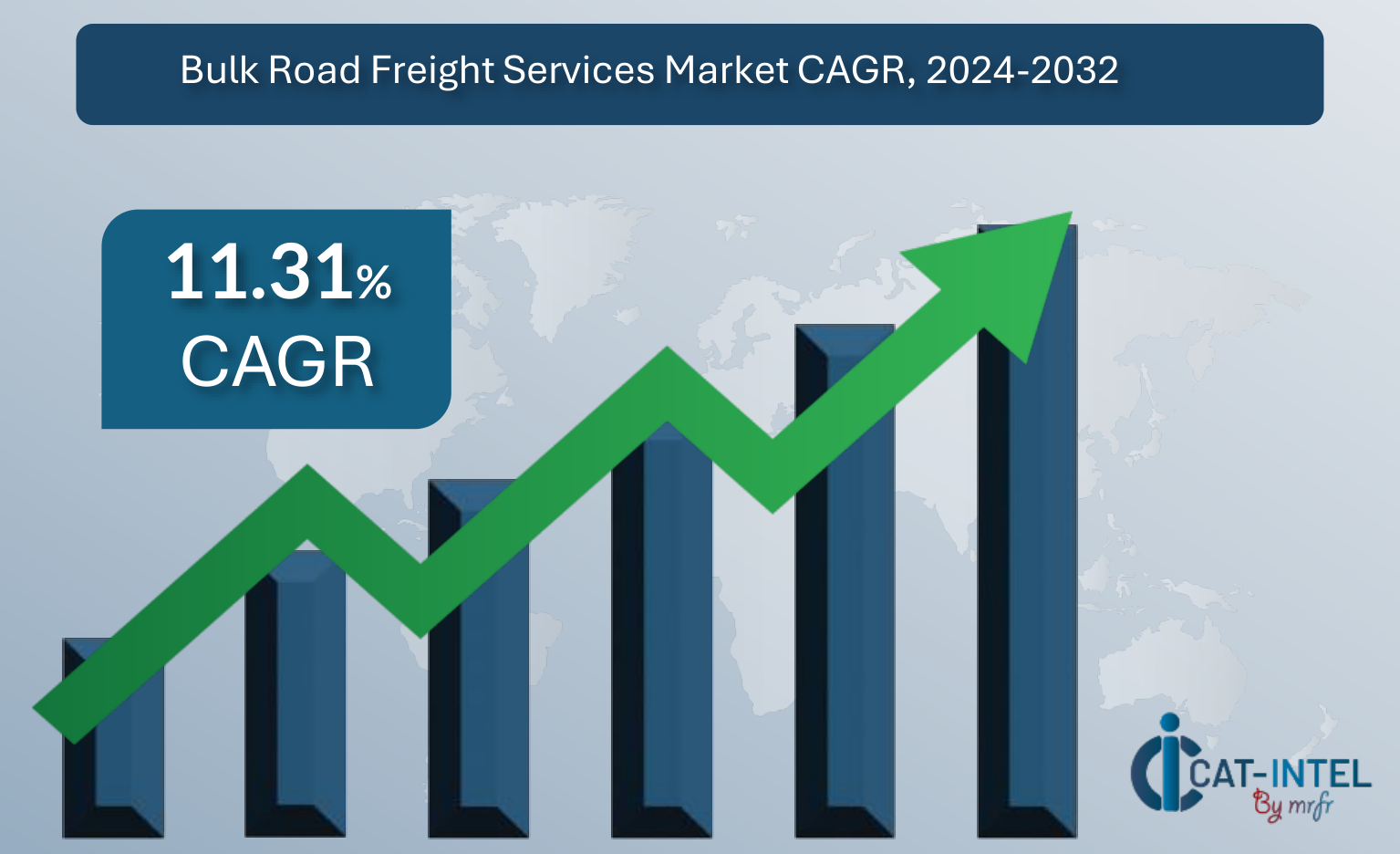
-
Sector Contributions: Growth is largely driven by: - Industrial Growth: Increased demand for transporting bulk materials across industries such as agriculture, chemicals, and construction.
- Regulatory Compliance: Stricter regulations regarding the transportation of hazardous and perishable goods are driving demand for specialized freight solutions.
-
Technological Advancements: The integration of real-time tracking systems, route optimization tools, and automated freight management solutions is driving efficiency and cost-effectiveness in bulk road freight services. -
Sustainability Focus: Rising emphasis on eco-friendly practices is encouraging companies to adopt fuel-efficient vehicles and sustainable logistics practices to reduce carbon footprints. -
Investment in Infrastructure: Companies are investing in advanced fleet management systems and expanding their transport networks to enhance service reliability and meet growing demand. -
Regional Insights: North America and Europe dominate the market due to their robust infrastructure, while emerging markets in Asia-Pacific are showing rapid growth driven by industrial expansion.
Key Trends and Sustainability Outlook:
-
Digital Transformation: Widespread adoption of automated logistics solutions and real-time data analytics is optimizing fleet operations and improving service timelines. -
Advanced Freight Solutions: Introduction of modular vehicles and multi-modal transport solutions is increasing efficiency in bulk freight services. -
Customized Services: Rising demand for tailored freight solutions to meet specific industry and regulatory requirements. -
Eco-Friendly Practices: Companies are focusing on sustainable transport options, such as electric and hybrid vehicles, to align with global environmental goals.
Growth Drivers:
-
Industrial Expansion: Accelerating industrialization and urbanization are increasing the need for bulk transportation services. -
Regulatory Stringency: Enhanced safety and environmental standards are fostering demand for specialized freight services. -
Innovation in Logistics: Emerging technologies, such as telematics and predictive maintenance, are improving operational efficiency and reducing costs. -
Focus on Sustainability: Adoption of green logistics practices, including alternative fuel usage and optimized routes, is gaining traction. -
Customized Freight Solutions: Tailored transport solutions are addressing specific industry needs, ensuring regulatory compliance and operational efficiency.
Overview of Market Intelligence Services for Bulk Road Freight Services:
The bulk road freight market faces rising operational costs due to increasing regulatory demands and fuel price volatility. Comprehensive market intelligence reports offer detailed cost projections and identify procurement savings opportunities, helping logistics companies manage cost fluctuations while maintaining high service standards. By leveraging these insights, businesses can adopt cost-efficient strategies and enhance procurement frameworks, ensuring competitiveness in a rapidly evolving market.
Procurement Intelligence for Bulk Road Freight Services: Category Management and Strategic Sourcing:
To stay ahead in the bulk road freight services market, companies are optimizing procurement strategies by implementing spend analysis tools to monitor vendor expenses and improving supply chain efficiency through market intelligence. Effective category management and strategic sourcing are pivotal in achieving cost-efficient procurement while ensuring timely access to essential resources required for delivering high-quality freight services.

Pricing Outlook for Bulk Road Freight Services: Spend Analysis
The pricing outlook for bulk road freight services is expected to remain relatively stable, with the possibility of moderate price increases due to various factors. Rising fuel prices, regulatory compliance requirements, and investments in fleet upgrades and technological advancements are primary contributors to potential cost escalations. With increasing demand for reliable and efficient freight services across industries, these factors may result in higher transportation fees.
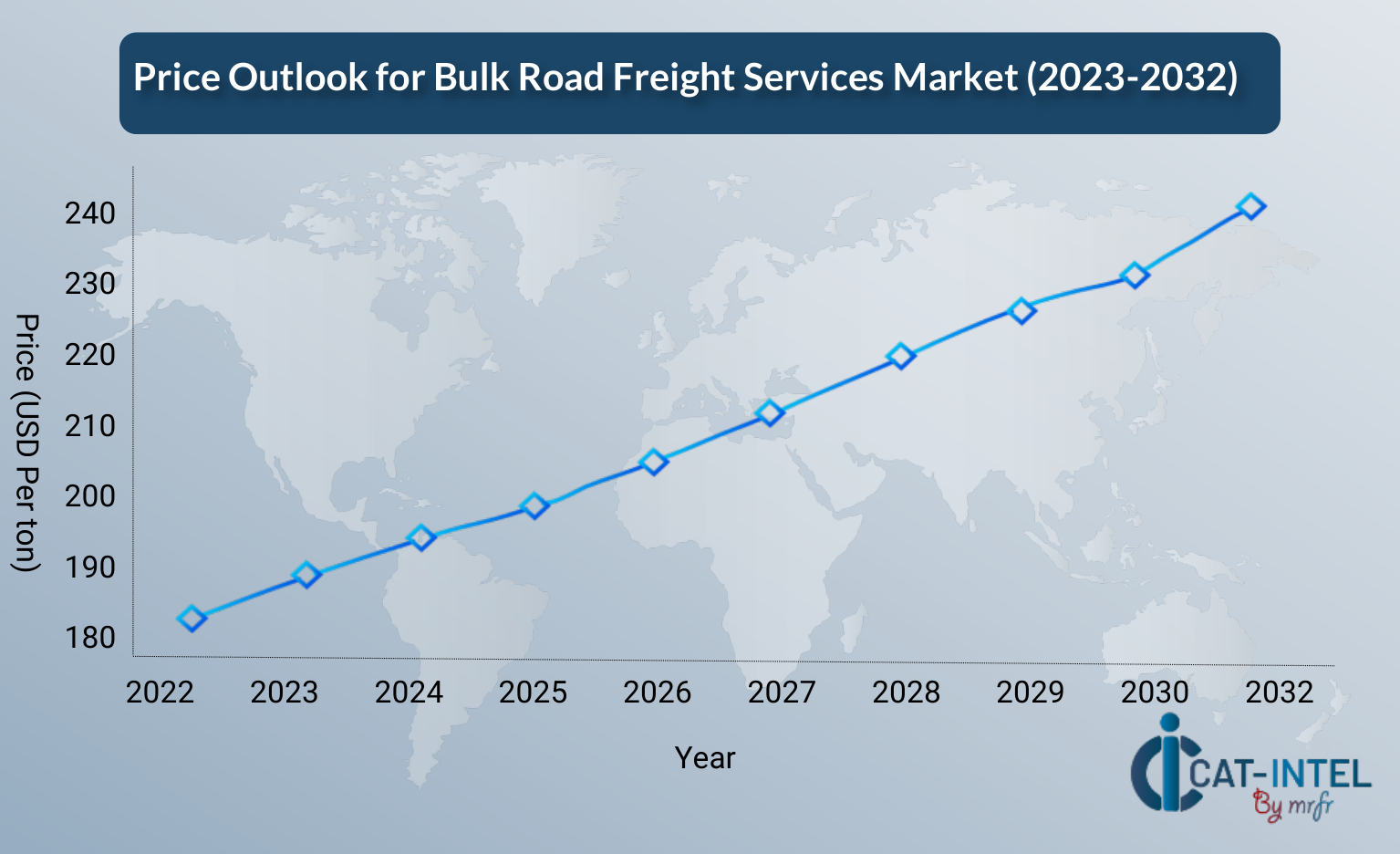
Graph shows general upward trend pricing for bulk road freight services and growing demand. However, there may be fluctuations influenced by economic conditions, technological advancements, and competitive dynamic.
Efforts to improve operational efficiency, optimize logistics routes, and adopt digital freight management tools can help companies maintain competitive pricing over time. Collaborations with sustainable logistics providers or technology partners may offer cost-effective solutions while improving service quality.
Despite potential cost pressures, a focus on innovation, efficiency, and sustainability will be crucial for managing pricing effectively. As demand for bulk road freight services grows, achieving a balance between cost efficiency and high service standards will be vital for industry stakeholders.
Cost Breakdown for Bulk Road Freight Services Total Cost of Ownership (TCO) and Cost-Saving Opportunities:
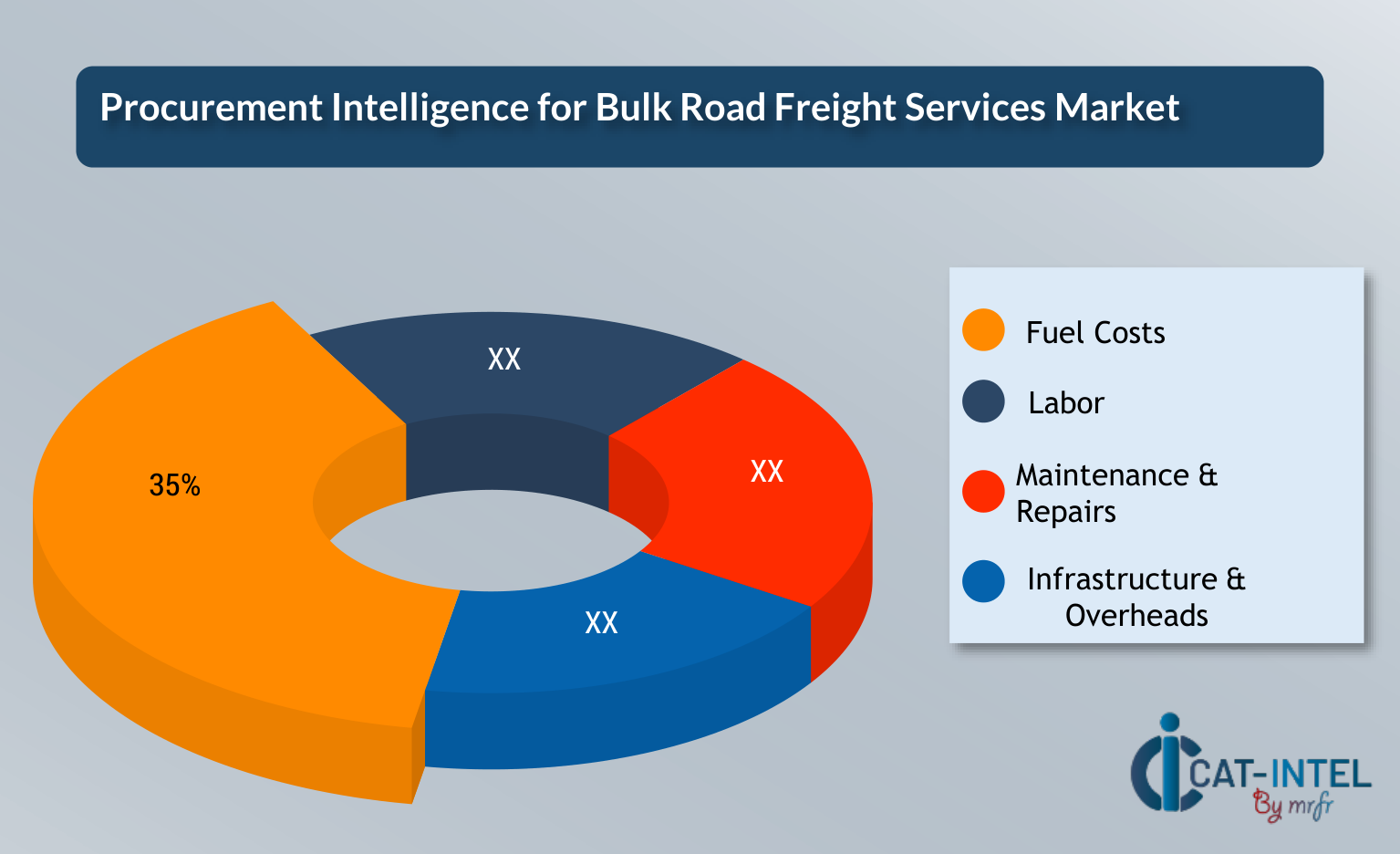
- Fuel Costs (35%)
- Description: Raw materials in BA/BE studies mainly include pharmaceutical compounds, formulations, test drugs, and consumables needed for clinical trials and laboratory processes. These materials must meet strict quality standards to ensure accurate results and regulatory compliance.
- Trends: Increasing demand for high-quality, sustainable raw materials is driving the market. A shift towards eco-friendly and ethically sourced materials is becoming more prominent as regulatory requirements tighten and sustainability concerns grow. Additionally, technological advancements are improving the sourcing and efficiency of raw material usage in clinical settings.
- Labor (XX%)
- Maintenance & Repairs (XX%)
- Infrastructure & Overheads (XX%)
Cost-Saving Opportunities: Negotiation Levers and Purchasing Negotiation Strategies
In optimizing procurement and operational methods, bulk road freight services can achieve significant cost reductions and enhance supply chain efficiency. Establishing partnerships with transport providers, logistics networks, and fuel suppliers allows businesses to leverage bulk discounts and shared resources, reducing per-unit transportation costs and improving negotiation leverage for favourable terms.
Investing in modernized logistics technologies, such as route optimization software and fleet tracking systems, can enhance operational efficiency by minimizing fuel wastage, improving delivery times, and reducing maintenance expenses. Adopting sustainable practices, including fuel-efficient vehicles and alternative energy sources, not only cuts costs but also bolsters brand reputation among eco-conscious clients and stakeholders.
Supply and Demand Overview for Bulk Road Freight Services: Demand-Supply Dynamics and Buyer Intelligence for Effective Supplier Relationship Management (SRM)
The bulk road freight services market is witnessing robust growth, driven by rising industrialization, increased global trade, and advancements in logistics technologies. High demand for cost-effective and reliable bulk transportation services is supported by collaborations between industries, logistics providers, and regulatory agencies.
Demand Factors:
-
Growing Industrial Needs: Increasing demand for transporting raw materials, agricultural products, and hazardous goods drives the need for efficient bulk road freight services. -
Expansion in Emerging Economies: Infrastructure development and growing industrial activity in emerging markets are increasing the demand for freight services to support supply chain operations. -
Stringent Safety Regulations: Regulatory compliance for hazardous and perishable goods transportation raises the demand for specialized freight solutions. -
E-commerce Growth: The rise of e-commerce has created additional demand for bulk logistics solutions to handle high-volume goods efficiently.
Supply Factors:
-
Technological Advancements in Logistics: Innovations in fleet management systems, tracking tools, and automated logistics processes are enhancing the supply side by improving service quality and efficiency. -
Availability of Skilled Drivers and Operators: Access to trained drivers and logistics professionals impacts the ability of companies to meet growing demand, with shortages potentially leading to supply constraints. -
Fleet and Infrastructure Capacity: Well-maintained fleets and advanced logistics hubs help manage fluctuating demand while ensuring timely and reliable transportation services. -
Competitive Market Dynamics: An increasing number of logistics providers are improving service quality and efficiency, although this competition also creates pressure on pricing and resource allocation as firms aim to offer cost-effective solutions.
Regional Demand-Supply Outlook: Bulk Road Freight Services:
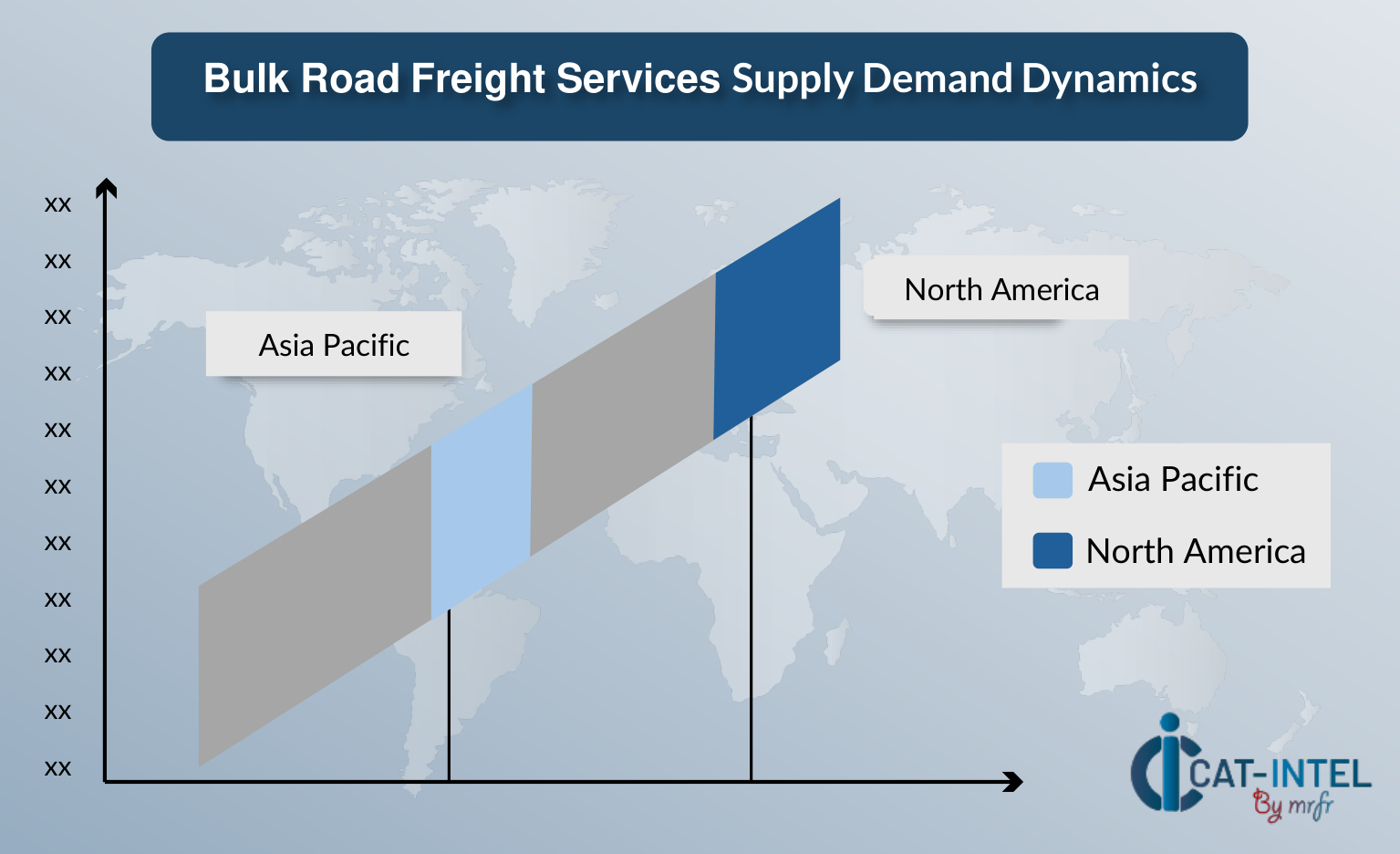
The Image shows growing demand for bulk road freight services in both North America and Asia, with potential price increases and increased Competition.
North America: Dominance in Bulk Road Freight Services
North America, particularly the U.S. and Canada, maintains a leading position in the bulk road freight services market, driven by the following factors:
-
High Industrial and Agricultural Output: The region's robust industrial base and extensive agricultural activities create consistent demand for bulk transportation solutions, supporting efficient movement of raw materials, commodities, and goods across vast distances. -
Advanced Infrastructure: North America benefits from a well-developed network of highways, freight corridors, and logistics hubs. This extensive infrastructure facilitates timely and reliable bulk freight services, enhancing operational efficiency. -
Stringent Safety and Environmental Regulations: Regulatory frameworks in the U.S. and Canada prioritize safety and environmental standards for bulk transportation, ensuring compliance with rules for hazardous materials and emission reduction. These standards drive innovation and service quality in the industry. -
Technological Advancements in Logistics: The region leverages cutting-edge technologies, including GPS-enabled fleet tracking, automated route optimization, and telematics, to improve delivery accuracy, reduce costs, and enhance supply chain transparency. -
Innovation in Fleet Management: North American companies are adopting sustainable and fuel-efficient vehicles, alongside exploring alternative energy sources such as electric trucks, to stay competitive and meet growing demands for eco-friendly logistics solutions.
North America Remains a key hub bulk road freight services can price drivers Innovation and Growth.
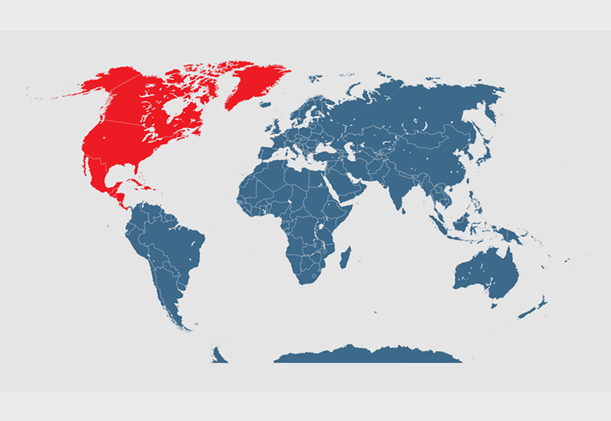
Supplier Landscape: Supplier Negotiations and Strategies:
The supplier landscape for bulk road freight services is diverse, featuring a mix of global logistics providers and regional transport companies. These suppliers play a critical role in shaping market dynamics by influencing pricing, innovation, and service availability. The market is highly competitive, with large-scale logistics companies commanding significant market share, while smaller firms focus on niche services or regional operations to enhance their presence.
Currently, the landscape reflects ongoing consolidation among major logistics providers, enabling them to offer comprehensive freight solutions. However, smaller and regional players are gaining traction by providing specialized services, such as eco-friendly transport options, or focusing on specific industries like agriculture or chemicals.
Some key suppliers in the bulk road freight services market include:
- Schneider National
- Knight-Swift Transportation Holdings
- JB Hunt Transport Services
- XPO Logistics
- YRC Worldwide (Yellow Corporation)
- Old Dominion Freight Line
- Landstar System
- Werner Enterprises
- UPS Freight
- ArcBest Corporation

Key Developments Procurement Category Significant Development:
|
Bulk Road Freight Services Attribute/Metric |
Details |
Market Sizing |
Global bulk road freight services market is anticipated to reach USD 100.81 Billion by 2032, expanding at a CAGR of approximately 11.31% from 2024 to 2032. |
Bulk Road Freight Services Technology Adoption Rate |
Around 45% of logistics firms are adopting advanced technologies such as GPS tracking, route optimization, and fleet management systems for better service efficiency. |
|
Top Bulk Road Freight Services Strategies for 2024 |
Focus on reducing operational costs, optimizing fleet capacity, adopting sustainability practices, and enhancing customer service through digital tools. |
Bulk Road Freight Services Process Automation |
Approximately 35% of logistics companies have automated route planning, scheduling, and tracking to streamline freight processes and improve efficiency. |
Bulk Road Freight Services Process Challenges |
Key challenges include rising fuel costs, regulatory compliance, traffic congestion, and the need for skilled labor. |
Key Suppliers |
Leading providers include XPO Logistics, JB Hunt, Schneider National, Old Dominion Freight Line, and Landstar, offering comprehensive freight solutions.. |
Key Regions Covered |
North America, Europe, and Asia-Pacific, with major markets in the U.S., China, India, and Germany due to strong industrial sectors and transport infrastructure. |
Market Drivers and Trends |
Growth driven by the expansion of e-commerce, demand for faster delivery times, regulatory pressures for sustainability, and advancements in freight technology. |










